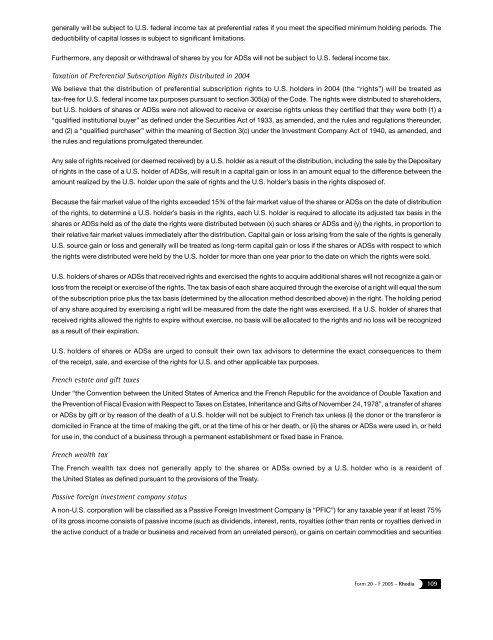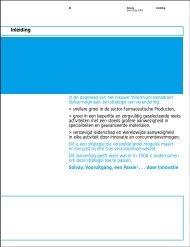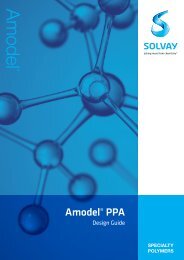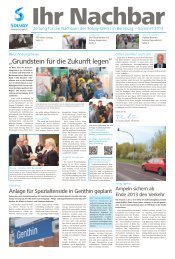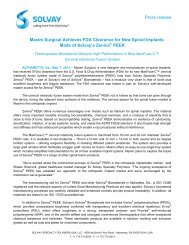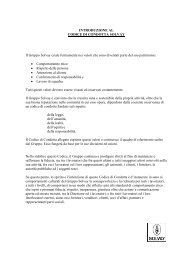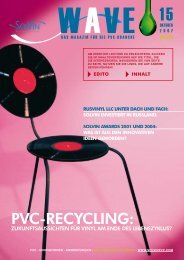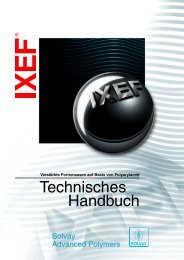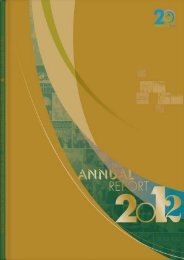Form 20-F 2005
Form 20-F 2005
Form 20-F 2005
You also want an ePaper? Increase the reach of your titles
YUMPU automatically turns print PDFs into web optimized ePapers that Google loves.
generally will be subject to U.S. federal income tax at preferential rates if you meet the specified minimum holding periods. The<br />
deductibility of capital losses is subject to significant limitations.<br />
Furthermore, any deposit or withdrawal of shares by you for ADSs will not be subject to U.S. federal income tax.<br />
Taxation of Preferential Subscription Rights Distributed in <strong>20</strong>04<br />
We believe that the distribution of preferential subscription rights to U.S. holders in <strong>20</strong>04 (the “rights”) will be treated as<br />
tax-free for U.S. federal income tax purposes pursuant to section 305(a) of the Code. The rights were distributed to shareholders,<br />
but U.S. holders of shares or ADSs were not allowed to receive or exercise rights unless they certified that they were both (1) a<br />
“qualified institutional buyer” as defined under the Securities Act of 1933, as amended, and the rules and regulations thereunder,<br />
and (2) a “qualified purchaser” within the meaning of Section 3(c) under the Investment Company Act of 1940, as amended, and<br />
the rules and regulations promulgated thereunder.<br />
Any sale of rights received (or deemed received) by a U.S. holder as a result of the distribution, including the sale by the Depositary<br />
of rights in the case of a U.S. holder of ADSs, will result in a capital gain or loss in an amount equal to the difference between the<br />
amount realized by the U.S. holder upon the sale of rights and the U.S. holder’s basis in the rights disposed of.<br />
Because the fair market value of the rights exceeded 15% of the fair market value of the shares or ADSs on the date of distribution<br />
of the rights, to determine a U.S. holder’s basis in the rights, each U.S. holder is required to allocate its adjusted tax basis in the<br />
shares or ADSs held as of the date the rights were distributed between (x) such shares or ADSs and (y) the rights, in proportion to<br />
their relative fair market values immediately after the distribution. Capital gain or loss arising from the sale of the rights is generally<br />
U.S. source gain or loss and generally will be treated as long-term capital gain or loss if the shares or ADSs with respect to which<br />
the rights were distributed were held by the U.S. holder for more than one year prior to the date on which the rights were sold.<br />
U.S. holders of shares or ADSs that received rights and exercised the rights to acquire additional shares will not recognize a gain or<br />
loss from the receipt or exercise of the rights. The tax basis of each share acquired through the exercise of a right will equal the sum<br />
of the subscription price plus the tax basis (determined by the allocation method described above) in the right. The holding period<br />
of any share acquired by exercising a right will be measured from the date the right was exercised. If a U.S. holder of shares that<br />
received rights allowed the rights to expire without exercise, no basis will be allocated to the rights and no loss will be recognized<br />
as a result of their expiration.<br />
U.S. holders of shares or ADSs are urged to consult their own tax advisors to determine the exact consequences to them<br />
of the receipt, sale, and exercise of the rights for U.S. and other applicable tax purposes.<br />
French estate and gift taxes<br />
Under “the Convention between the United States of America and the French Republic for the avoidance of Double Taxation and<br />
the Prevention of Fiscal Evasion with Respect to Taxes on Estates, Inheritance and Gifts of November 24, 1978”, a transfer of shares<br />
or ADSs by gift or by reason of the death of a U.S. holder will not be subject to French tax unless (i) the donor or the transferor is<br />
domiciled in France at the time of making the gift, or at the time of his or her death, or (ii) the shares or ADSs were used in, or held<br />
for use in, the conduct of a business through a permanent establishment or fixed base in France.<br />
French wealth tax<br />
The French wealth tax does not generally apply to the shares or ADSs owned by a U.S. holder who is a resident of<br />
the United States as defined pursuant to the provisions of the Treaty.<br />
Passive foreign investment company status<br />
A non-U.S. corporation will be classified as a Passive Foreign Investment Company (a “PFIC”) for any taxable year if at least 75%<br />
of its gross income consists of passive income (such as dividends, interest, rents, royalties (other than rents or royalties derived in<br />
the active conduct of a trade or business and received from an unrelated person), or gains on certain commodities and securities<br />
<strong>Form</strong> <strong>20</strong> - F <strong>20</strong>05 - Rhodia<br />
109


